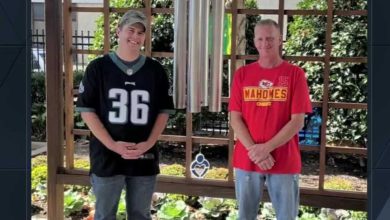
She ran toward the screams.
Kathy Platoni ran as fast as she could, but soldiers blocked her path. They carried bodies toward her, and some were already dead. She remembers their eyes.
The fear. The shock.
Platoni dragged people into back rooms, barricaded doors and searched for medical supplies. She slammed computers onto the ground and grabbed tablecloths underneath. She needed something to stop the bleeding.
Col. Platoni was at a military base in Texas when the shooting started. It was Nov. 5, 2009, and she was preparing to deploy to Afghanistan. When the shooting stopped, 13 were dead and dozens of others injured. Five people from her team died that day. One died at her knees.
She told him he was going to make it.
…
The nightmares started again.
Jake’s long war: ‘I knew something was going to happen. I just didn’t know what to do.’
‘It’s the truth’: The forgotten soldier and the father who is still fighting his war
Gunfire. Death. Demeaning commanders and improvised explosive devices. She can't remember the specifics of these dreams, or she’d write them down. Writing helps her deal with pain.
Platoni is a clinical psychologist who deployed to Guantanamo Bay, Iraq and Afghanistan more than a decade ago. Her nightmares began again in August after the Taliban took Kabul, Afghanistan’s capital. They began again after she saw video of desperate people trying to hang onto an airplane leaving the country. After she heard news of a suicide bomber and 13 American military deaths at the airport.
Platoni had been to this airport. She deployed to Afghanistan just 30 days after the deadliest shooting at a military base in U.S. history. Thirty days after an Army major turned his gun on the very people he was supposed to protect.
Thirty days after life as Platoni knew it ended.
Because the Fort Hood shooting was only the beginning. Platoni may laugh like a cartoon character – and she is a character, almost a caricature – but the trauma in her life cannot be fictionalized. It would be too unbelievable.
In the Army, her job was to fix broken service members. Or at least patch them up enough so they could complete their mission. Living in Afghanistan, she said, felt like living inside a dryer set on high. On more than one occasion, she slept on rubble piles left by mortar attacks.
Nowhere felt safe.
Even though she was a psychologist, Platoni often carried a gun. Her job took her to devastated units that lost teammates, sometimes in horrible ways. To help them, she lived with them. She talked to them. She listened.
Their pain became her pain. And it’s all coming back now. For her and her patients.

Today, Platoni only accepts military veterans or first responders as patients. Those patients call her Doc. An Army buddy calls her War Dog. And her husband calls her Runtbo, a tribute to Rambo and Platoni's small stature (4 feet, 11 inches and proudly able to fit inside an Army duffel bag).
Watching the fall of Afghanistan, one of her patients said, felt like a friend dying. Or like you left a friend behind, and then that friend died. This patient is a police officer who served in Iraq. He said it's been harder watching what's happened in Afghanistan than the civil unrest in America over police shootings.
Because the war on terror, which once seemed like it would never end, finally did. Now, it’s the suffering that seems never-ending. Afghanistan is not Platoni’s only problem – her mother died during her deployment there in 2010 – but it is the battlefield where she fights her wars.
A war on terror. A war of survivor’s guilt. A war inside her own head.
In a life full of breaking points, Platoni now finds herself staring down the barrel of another. This fall, she wrote a letter and addressed it to friends and family. It was an apology.
In the letter, she wrote about police shootings and seven-day workweeks and an officer’s suicide from a department she counsels. She wrote about her dog dying a death of unexpected seizures and pneumonia. She wrote about a trip to the ER for an officer shot in the head and another trip to the ER because a dog bit her in the face. She wrote about attending seven funerals in eight weeks.
She wrote: “There is not much left of me.”
…
She didn’t have to go to Afghanistan.
After Fort Hood, the Army gave her a choice. But for Platoni, there was nothing to decide. This was the same woman who within weeks of finishing a deployment at Guantanamo Bay volunteered to go to Iraq. And this was the same woman who, before that, traveled to New York City to treat first responders after the terrorist attacks of Sept. 11, 2001.
In New York, the people she helped called her Rat on Crack. It was supposed to be a compliment, because she never stopped.

Growing up, Platoni never wanted to join the military. Her mom was a schoolteacher, and Platoni even protested the Vietnam War. Her dad was a World War II veteran who sometimes drank too much and suffered radiation exposure during his service.
Before the military, Platoni cleaned porcelain plates at a jewelry shop for $2.50 an hour. Even with a master’s degree, she couldn’t get a psychology job. She signed up for the Army to pay for more school.
In her office near Dayton, more than four decades later, the therapist sits in front of a security screen. She knows exactly where her guns are. And when her last patient leaves, she locks the door. For her, post-traumatic stress disorder means anger and paranoia.
It means yelling and screaming at the TV when Afghanistan comes up. It means her husband is careful not to touch her when she’s sleeping. To wake her up, he stands by the bedroom door and quietly says her name.
When asked by her own therapist what she does to take care of herself, Platoni doesn’t have much of an answer. She makes a face as if the thought has rarely crossed her mind.
"I eat healthy," she says.
Platoni buries herself in work. In damaged patients and damaged institutions. Because she knows their misery firsthand. And she knows how hard it can be to ask for help.
In the last two decades, 7,057 service members have died in military operations. During that same time, an estimated 30,177 people who served after 9/11 have killed themselves. In some cases, the suicide rate for veterans is 2½ times higher than that of civilians.
And it appears to be getting worse.
It was Jan. 3, 2010, when Platoni's unit, the 467th Medical Detachment, reached the Slayer Platoon in Afghanistan. This team was dealing with the aftermath of a roadside bomb, which killed multiple people. When the first bomb went off, the rest of the team began searching for the dead.
One soldier could only find the torso of his friend, a man they called Link.
He radioed for help and began to carry what was left of his friend across the Arghandab River. That’s when the next bomb went off. Platoni was there when a Black Hawk helicopter brought the remains back. Body parts were blown into so many pieces, she said, they had to be swept out of the helicopter.
These days, when Platoni speaks to her own therapist, she mostly talks about her mother’s death. Because she’s already told him about Fort Hood.
About a smoky room and 214 rounds of gunfire. About floors slippery with blood. About a pregnant woman begging for her unborn child’s life. About her assignment to be the shooter’s direct supervisor when deployed to Afghanistan. About her colleague who died rushing the gunman with a chair.
About the FBI and witness statements. About the people she saw yelling and vomiting and crying and breaking things. About the morning after. About roll call, where commanders read names alphabetically.
About how if a name was repeated three times, it meant that person was dead.
…
Platoni wears a bracelet on her wrist honoring the five people from her team who died at Fort Hood. She only takes it off for airport security. And when she dies, she’ll be buried in it.

For years, Platoni has advocated for Fort Hood victims and their families to receive Purple Hearts and access to the benefits that come with those prestigious medals. A few years ago, I called her for a story about a local soldier injured during the shooting in Killeen, Texas. This soldier didn’t receive the help he needed back home, and this soldier killed himself in 2013.
At the time, Platoni told me, at least four service members who were at Fort Hood that day and three members of their families had killed themselves.
“There will be more,” she said.
In September, I met Platoni in her office warmed by space heaters. In one framed picture of Fort Hood, Platoni hugged a nurse who used underwear as a tourniquet to treat the wounded. In the living room, she printed out a news article and handed it to me.
The story described a letter written by the Fort Hood shooter, a man now awaiting execution in a Kansas prison. In this printout, a white box covered the man’s face in a photo below the headline:
Fort Hood shooter congratulates Taliban from death row
“We have won,” the shooter wrote.
A punch to the stomach does not accurately describe what it felt like reading that. Platoni almost threw up. She chose to go to Afghanistan after witnessing such horror for one reason: She believed it was the shooter’s mission to stop their mission.
And she would not be stopped.

Even today, at 69 years old, she makes a guttural sound when asked if she would go back to war.
“Hell yeah,” she says. “Where’s my bag?”
…
Platoni has spent the last few weeks crying on her drive into work.
Today, as with most days, she's been up since 4 a.m. It’s a cold morning the day before the 12th anniversary of the Fort Hood shooting. Platoni checks email in her office before a session with her therapist. The door is locked.
I had asked her husband how long she can keep this up.
“I don’t know,” he said, before a long pause.
“As long as she can,” he said eventually.
Sitting in her own waiting room on plastic couch covers, Platoni holds a cellphone in her hand. She usually paces during these sessions because she has trouble sitting still.

Platoni tells her therapist about letters addressed to 91 members of Congress, all the ones who served in the military. The letters detail how the government’s handling of Fort Hood hurt veterans like her. The letters are written, but she hasn’t mailed them. She doesn’t know if she will.
“I don’t know if I can face another failure,” she says.
After therapy, she plays a video on her computer from one of the units she embedded with. Helicopters fire down into the ground and grenades explode. Soldiers yell.
“Welcome to hell,” she says.
“I wish I could go back.”
Toward the end of the video, there is a memorial set to the song “Boulevard of Broken Dreams.” Platoni looks like she might cry. More than the soldiers who died, she is thinking about the ones who survived.
Looking through old war photos, she comes across a picture of Capt. John Gaffaney, the man who died in front of her. The man she couldn’t save. After a moment, she looks away.
The anger. The paranoia. It’s all still there, more than a decade later. It always will be.
Platoni tells me this, and she tells me about memorial services. About guns in boots and then going back to work in the desert. She tells me about desert life.

Desert life is using plastic bags for toilets and tossing those bags onto burning piles of feces. Desert life is breathing airborne fecal matter for months. Desert life is military life, and it’s surviving on stale Cheerios and Fruit Loops because mealtime is interrupted by mortar fire. Desert life is a body bag filled with a young boy only a few months removed from high school graduation. Desert life is a mountainous landscape of tanks blown up and reduced to the size of banquet tables.
Desert life is dreaming of a shower once every six weeks. Desert life is thinking about killing yourself. Desert life is sleeping with a loaded gun closer to your head than a pillow. Desert life is an alarm clock of gunfire.
Desert life is realizing it’s actually the silence that scares you most.
Even though American troops have withdrawn from Afghanistan, Platoni tells me it feels like she’s back at war. She tells me she feels betrayed. She tells me she worries about another 9/11.
She tells me this. She can’t believe she’s telling me this. She tells me the Fort Hood shooter was right.
The Taliban won.
…
If you are depressed or having suicidal thoughts, help is available. Crisis Text Line provides free, 24/7, confidential support via text by messaging 741741. The National Suicide Prevention Lifeline is 800-273-8255.
Source link






